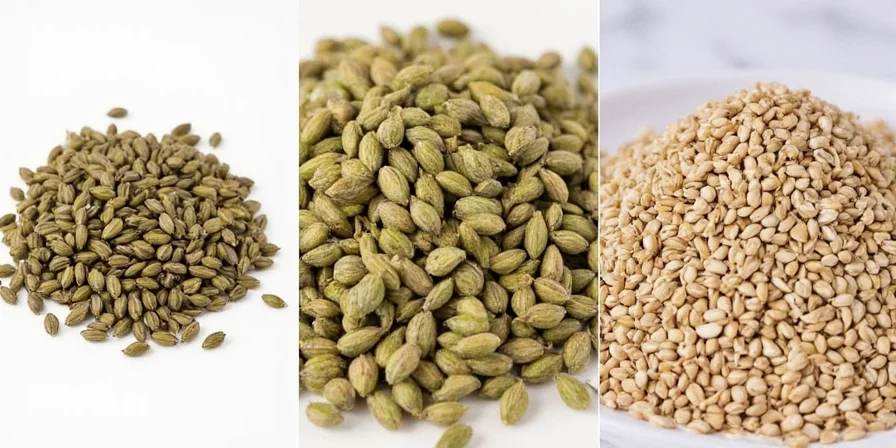Exploring Coriander Seeds and Their Substitutes
Coriander seeds are a staple spice in many culinary traditions around the world, revered for their unique flavor and aroma. However, there may be occasions when you run out of coriander seeds or perhaps are seeking an alternative due to personal taste preferences. This comprehensive guide will explore potential substitutes for coriander seeds, along with tips on spice storage and usage hacks that ensure your kitchen remains a flavorful haven.
Understanding Coriander Seeds
Coriander seeds come from the Coriandrum sativum plant, which is widely known as cilantro when referring to its leaves. The seeds possess a warm, nutty flavor with citrus undertones, making them an essential ingredient in various cuisines, including Indian, Middle Eastern, and Mediterranean dishes. They can be used whole or ground, and their distinct flavor profile can enhance everything from curries to baked goods.
Common Uses of Coriander Seeds
- In spice blends like garam masala and curry powder.
- For flavoring pickles and marinades.
- In baking, particularly in bread and cookies.
- To season meats and vegetables.
Why Substitute Coriander Seeds?
There are several scenarios in which you might find yourself needing a substitute for coriander seeds:
- Allergy or Sensitivity: Some individuals may be allergic to coriander or cilantro.
- Flavor Preferences: Not everyone enjoys the taste of coriander.
- Ingredient Availability: You may run out of coriander seeds and need a quick alternative.
Top Substitutes for Coriander Seeds
Here are some excellent alternatives to coriander seeds, each with its unique flavor profile:
1. Cumin Seeds
Cumin seeds have a warm, earthy flavor that can somewhat mimic the taste of coriander. While not identical, they can provide a similar depth to dishes.
- Ratio: Use an equal amount of cumin seeds as a substitute for coriander seeds.
2. Caraway Seeds
Caraway seeds share a slightly sweet and anise-like flavor, making them a decent substitute for coriander seeds, especially in baked goods or savory dishes.
- Ratio: Replace coriander seeds with an equal amount of caraway seeds.
3. Fennel Seeds
Fennel seeds offer a sweet, licorice-like flavor. While they differ in taste, they can still add a pleasant complexity when used in moderation.
- Ratio: Use half the amount of fennel seeds compared to coriander seeds due to their stronger flavor.
4. Dill Seeds
Dill seeds have a milder flavor but can work well in certain recipes, particularly in pickles and marinades.
- Ratio: Use an equal amount of dill seeds as a substitute.
5. Thai Basil Seeds
For a fresh twist, Thai basil seeds can be used in some Southeast Asian dishes. They provide a unique flavor that can complement various ingredients.
- Ratio: Use a slightly lesser amount than coriander seeds, adjusting to taste.
How to Choose the Best Substitute
When selecting a substitute for coriander seeds, consider the following factors:
- Flavor Profile: Think about the overall flavor of the dish and how the substitute will interact with other ingredients.
- Cooking Method: Some substitutes work better in certain cooking methods, such as roasting or simmering.
- Personal Preferences: Experiment with different options to find what suits your palate best.
Spice Storage Hacks
Proper storage of spices is crucial to maintaining their flavor and aroma over time. Here are some practical hacks to keep your spices, including coriander seeds, fresh:
1. Use Airtight Containers
Store your spices in airtight containers to prevent exposure to air, moisture, and light, which can degrade their quality.
2. Keep Spices Cool and Dark
Locate a cool, dark place in your kitchen to store spices, away from heat sources like the stove and direct sunlight.
3. Label Your Containers
Clearly label your spice containers with the name and date of purchase to keep track of freshness.
4. Avoid Purchasing in Bulk
Unless you're a heavy user of a specific spice, avoid buying in bulk, as spices lose potency over time. Purchase smaller quantities more frequently.
Using Ground Coriander as a Substitute
If you have ground coriander on hand, you can also use it as a substitute for whole coriander seeds, although the flavor may be slightly different.
- Ratio: Use one teaspoon of ground coriander for every teaspoon of coriander seeds.
Conclusion
Coriander seeds are a beloved spice, but when they’re unavailable, there are plenty of substitutes that can be utilized without sacrificing flavor. Experiment with the options available, and remember the importance of proper spice storage to keep your kitchen stocked with fresh flavors. Whether you choose cumin, caraway, fennel, or another alternative, you're sure to enhance your dishes with delightful tastes.
Illustration

Explore various substitutes for coriander seeds in your culinary adventures!










 浙公网安备
33010002000092号
浙公网安备
33010002000092号 浙B2-20120091-4
浙B2-20120091-4